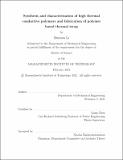| dc.contributor.advisor | Gang Chen. | en_US |
| dc.contributor.author | Li, Buxuan. | en_US |
| dc.contributor.other | Massachusetts Institute of Technology. Department of Mechanical Engineering. | en_US |
| dc.date.accessioned | 2021-05-25T18:23:33Z | |
| dc.date.available | 2021-05-25T18:23:33Z | |
| dc.date.copyright | 2021 | en_US |
| dc.date.issued | 2021 | en_US |
| dc.identifier.uri | https://hdl.handle.net/1721.1/130863 | |
| dc.description | Thesis: S.M., Massachusetts Institute of Technology, Department of Mechanical Engineering, February, 2021 | en_US |
| dc.description | Cataloged from the official PDF version of thesis. | en_US |
| dc.description | Includes bibliographical references (pages 66-70). | en_US |
| dc.description.abstract | Polymers have infiltrated almost every aspect of modern technology. Without polymer products, the society would look very different. As one of the most important and common engineering materials, traditional polymers are both electrically and thermally insulating, due to its organic nature and amorphous structures. In the late 20th century, electrically conductive polymers has been discovered. Thermally conductive polymers, however, were not demonstrated until the recent decades. Polymers are shown to have great potential in thermal conduction, even divergent thermal conductivity in theory. This counterintuitive finding is attributed to its one-dimensional periodic structure, where repeating monomers are connected by strong covalent bonds. | en_US |
| dc.description.abstract | Researchers have learned that special dynamics exist in non-linear one-dimensional chains since the Fermi-Pasta-Ulam-Tsingou report, where the evolution of state space was found to be non-ergodic, enabling an infinite long lifetime of excitations. As a result, such 1D nonlinear system favors scatter-free phonon transport. Molecular dynamics simulation shows a single polyethylene (PE) chain could have divergent thermal conductivity. Calculations from first principle also confirm the thermal conductivity is approximately 160 W/mK for bulk PE and 1400 W/mK for a single PE chain, with a three phonon process taken into consideration. In experiments, researchers measured enhanced thermal conductivity in stretched PE in the 1970s. In the last decades, researchers have made progress by demonstrating PE nanofibers with a thermal conductivity of over 100 W/mK. Recently, 2D PE films were fabricated and measured to have metal-like thermal conductivity of over 60 W/mK. | en_US |
| dc.description.abstract | With all these progresses, in this thesis, we aimed to develop scalable polyethylene films with high thermal conductivity and investigating temperature-dependent thermal transport properties. A differential steady state method was used to measure the thermal conductivity of the synthesized PE films. A thermal annealing of PE films was performed along with the temperature dependence test where a transition temperature was identified. Below the transition temperature, thermal annealing increased the thermal conductivity at room temperature. Above the transition temperature, thermal annealing irreversibly decreased the thermal conductivity. Our PE films featured reasonable thermal conductivity of 20~60 W/mK depending on draw ratio and much lower density comparing to metals such as copper and aluminum. A potential application of such films is a light-weight thermal strap, which is important for space technologies. | en_US |
| dc.description.abstract | We designed a strategy to overcome the issue that such films have a poor cross-plane thermal conductivity. We proved the idea based on both simulation and experiments. In simulations, we derived a steady state solution of a full-size physical device with conduction and radiation included. In experiments, we conducted a unit test on laboratory scale samples and argued its ability of scaling up by showing that multilayer PE films performed as expected. | en_US |
| dc.description.statementofresponsibility | by Buxuan Li. | en_US |
| dc.format.extent | 70 pages | en_US |
| dc.language.iso | eng | en_US |
| dc.publisher | Massachusetts Institute of Technology | en_US |
| dc.rights | MIT theses may be protected by copyright. Please reuse MIT thesis content according to the MIT Libraries Permissions Policy, which is available through the URL provided. | en_US |
| dc.rights.uri | http://dspace.mit.edu/handle/1721.1/7582 | en_US |
| dc.subject | Mechanical Engineering. | en_US |
| dc.title | Synthesis and characterization of high thermal conductive polymers and fabrication of polymer based thermal strap | en_US |
| dc.type | Thesis | en_US |
| dc.description.degree | S.M. | en_US |
| dc.contributor.department | Massachusetts Institute of Technology. Department of Mechanical Engineering | en_US |
| dc.identifier.oclc | 1252630914 | en_US |
| dc.description.collection | S.M. Massachusetts Institute of Technology, Department of Mechanical Engineering | en_US |
| dspace.imported | 2021-05-25T18:23:33Z | en_US |
| mit.thesis.degree | Master | en_US |
| mit.thesis.department | MechE | en_US |
